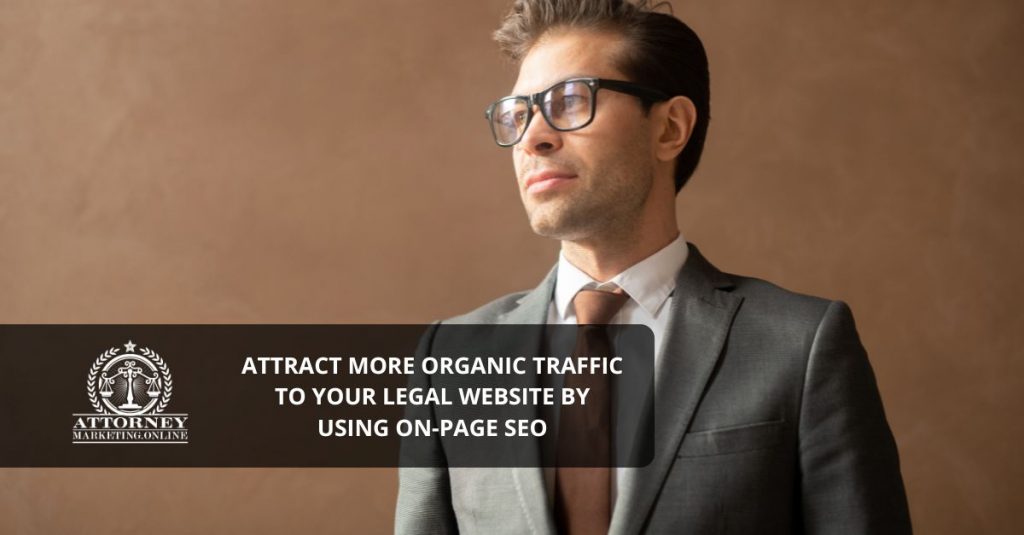Everyone wants their website to show up in the top results. Only individuals, though, fully satisfy the conditions in getting top rankings. That is why the use of on-page SEO is one of the most important elements used for boosting organic traffic to your legal website.
On-Page SEO is Necessary for Higher Search Engine Rankings
Deploying on-page SEO to optimize your website is easy. However, it does consume some time, so you’ll need the services of a digital marketing agency to handle the activity.
Most people who hire an attorney naturally go to legal firms sitting at the top of the SERPs. This elevated status naturally makes it simpler to attract new business. Therefore, an effective SEO strategy is imperative to a legal firm’s success.
SEO activities are split into two categories – on-page and off-page SEO. While the on-page type focuses on your website or blog, off-page SEO is used to support and promote your brand across the web. This includes gathering backlinks to your site.
In the most basic terms, on-page search engine optimization (SEO) covers building a website that appeals to your specific market while off-page SEO allows your firm to gain exposure online so you can build authority and trust for your website.
According to Forbes, 92% of businesses use Google. That is why on-page search engine optimization is a contributing factor to a legal site’s success.
Getting the Most Mileage an On-Page SEO StrategyThe info below aims to shed light on a few on-page SEO best practices that many website owners choose to ignore.
As a lawyer, you might wonder, “Why do I need to implement on-page search engine optimization?”, “After all, I can write knowledgeable and well-written posts.”
The main objective of doing this is to increase organic internet traffic. Search engines receive all the data they require from on-page-related SEO activities. That allows them to quickly index your website. Even if “Content is King,” you can’t expect to rank at the top without focusing on an on-page search engine strategy.
Reviewing People’s Search Habits
You need to know what people are searching for online. If the search engine determines that your content is not pertinent to the searchers, you won’t show up on the top list. That is why conducting a keyword analysis regularly is important to your website’s success.
Also, you’ll need the help of a digital marketing agency to keep your site working properly. That means your site needs to have fast load times.
After all, most people do not want to wait over 3 seconds for a website to load. Otherwise, they will quickly hit the back button to find another legal site.
Speed Up Your Load Time
Websites generally take about two seconds to load. If the site loads more slowly, you may need to do the following:
(1) Get rid of any HTML tags that are not necessary.
(2) Make the photos on your website smaller in size.
(3) Get rid of any Javascript you don’t need. Also, keep in mind that you must do this on all of your website’s pages, not just one.
(4) Getting rid of unnecessary plug-ins also helps increase your site’s speed.
Use the Correct Keyword Placement
You also want to make your title, meta description, and H1 tag natural. Therefore, using keywords in the title, meta description, and H1 tag can help your website rank higher. That way, search engine spiders can better understand the rationale behind your use of the material.
Identify with Your Readers
When readers read your content, they should feel what you are expressing. If not, they’ll choose one of your competitors. Even though this is one of the simplest SEO tips, you need to keep it in mind when developing your site.
Why You Need to Use Short and Easy-to-Remember URLs
Use succinct, detailed URLs: There are several benefits to keeping your URLs concise and relevant, including
(1) It makes it easier for the Google crawler to understand the goal of your website.
(2) You can use URLs to incorporate your keyword focus.
(3) By clicking on your link, users can see what information is available.
For example, https://www.xyz.com/2019/25/12/22356 has no significance whatsoever. The average person does not understand the connection between this connection and the link.
However, https://www.xyz.com/personalinjury invites people to visit your site.
Use Alt Tags for Images that Won’t Load
Use alt tags as a substitute for your images if they can’t load for some reason. Google crawlers can easily understand what is in a photo or how it relates to your text, thanks to alt tags.
Make Your Content Easy for a Layperson to Read
Most people can understand simpler content. After all, would you stay on a website if the precise meaning of what you’re reading is unclear?
Remember, Google records all activity on a website, including how much time a user spends on the platform. While legal subjects can get complex, it’s important to keep sentences succinct and to use straightforward language.
Connect and Interlink Pages
The Google crawler can connect the pages of your website thanks to interlinking. By making use of link authority and link juice, you’ll enjoy higher rankings.
For instance, maybe you’ve added a brand-new web page for SEO. You can link to the existing page on your website dedicated to a specific legal service. Google will then crawl your SEO website for your legal service page.
You might also add a link to a post topic that viewers have little info about. Therefore, you can use interlinking to direct your visitor to specific legal topics.
Contact a Top Digital Marketing Agency Today
If you want to improve your site’s search engine ranking, you’ll need to work with a digital marketing agency. Lawyers who rank well in the search results rely on Attorney Marketing. Online. Call the agency at (888) 992-9529 today.

